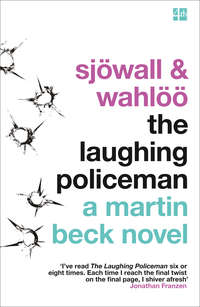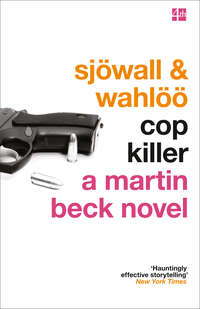
Полная версия
The Terrorists

MAJ SJÖWALL
AND PER WAHLÖÖ
The Terrorists
Translated from the Swedish by Joan Tate


Copyright
This novel is entirely a work of fiction. The names, characters and incidents portrayed in it are the work of the authors' imagination. Any resemblance to actual persons living or dead, events or localities is entirely coincidental.
Fourth Estate
An imprint of HarperCollinsPublishers Ltd. 1 London Bridge Street London SE1 9GF
www.harpercollins.co.uk
This ebook first published by Harper Perennial in 2009
This Fourth Estate edition published in 2016
This translation first published by Random House Inc, New York, in 1975
Originally published in Sweden by P. A. Norstedt & Söner Forlag
Copyright text © Random House Inc 1975
Copyright introduction © Dennis Lehane 2010
Cover photograph © Shutterstock
PS Section © Richard Shephard 2007
PS™ is a trademark of HarperCollins Publishers Ltd.
Maj Sjöwall and Per Wahlöö assert the moral right to be identified as the authors of this work
A catalogue record for this book is available from the British Library
All rights reserved under International and Pan-American Copyright Conventions. By payment of the required fees, you have been granted the non-exclusive, non-transferable right to access and read the text of this ebook on-screen. No part of this text may be reproduced, transmitted, down-loaded, decompiled, reverse engineered, or stored in or introduced into any information storage and retrieval system, in any form or by any means, whether electronic or mechanical, now known or hereinafter invented, without the express written permission of HarperCollins ebooks
HarperCollinsPublishers has made every reasonable effort to ensure that any picture content and written content in this ebook has been included or removed in accordance with the contractual and technological constraints in operation at the time of publication
Source ISBN: 9780007243006
Ebook Edition © APRIL 2009 ISBN: 9780007323418
Version: 2017-07-25
From the reviews of the Martin Beck series:
‘First class’
Daily Telegraph
‘One of the most authentic, gripping and profound collections of police procedural ever accomplished’
MICHAEL CONNELLY
‘Hauntingly effective storytelling’
New York Times
‘There's just no question about it: the reigning King and Queen of mystery fiction are Maj Sjöwall and her husband Per Wahlöö’
The National Observer
‘Sjöwall/Wahlöö are the best writers of police procedural in the world’
Birmingham Post
Contents
Cover
Title Page
Copyright
Praise
Introduction
Chapter 1
Chapter 2
Chapter 3
Chapter 4
Chapter 5
Chapter 6
Chapter 7
Chapter 8
Chapter 9
Chapter 10
Chapter 11
Chapter 12
Chapter 13
Chapter 14
Chapter 15
Chapter 16
Chapter 17
Chapter 18
Chapter 19
Chapter 20
Chapter 21
Chapter 22
Chapter 23
Chapter 24
Chapter 25
Chapter 26
Chapter 27
Chapter 28
Chapter 29
Keep Reading
About the Authors
Also by Maj Sjöwall and Per Wahlöö
About the Publisher
INTRODUCTION
As one might expect from a novel entitled The Terrorists, terrorism abounds in Maj Sjowall and Per Wahloo’s final Martin Beck police procedural. But the chaotic forms that terror takes are not simply that of the political assassinations that bookend the narrative (the first in Latin America, the second in Stockholm). Sjowall and Wahloo are after a much more expansive query of the very definition of terrorism. And so Martin Beck and his Murder Squad of disparate, contentious police officers don’t just engage an impending act of violent insurrection on the streets of Stockholm. They must also solve the murder of a wealthy pornographer and contend with the destruction of an eighteen-year-old naïf, Rebecka Lind, by the teeth of the social welfare system. All the while, their greatest enemy is not bullets or bombs, it’s the bureaucratic apparatus that exalts and rewards its own haplessness.
As this novel – the tenth in the series – is Martin Beck’s swan song, it’s worth noting that in the annals of realistic fictional policemen, Beck stands a full head above most. He carries plenty of psychic scars and admits to a depressive personality, but he’s not gloom laden to the point of masochistic self-pity that so often masquerades as a hard-boiled hero’s tragic worldview. Beck is a dogged worker bee entering his later middle-aged years with a healthy romantic life and no illusions about his place in the larger scheme of things. However exceptional, he is a civil servant. A great cop, yes, but in Sjowall and Wahloo’s vision, a great cop is little more than a great functionary in a hopelessly flawed system. Beck’s talents include ‘his good memory, his obstinacy, which was occasionally mule-like … his capacity for logical thought … [and finding] the time for everything that had anything to do with a case, even if this meant following up small details that later turned out to be of no significance.’ This is what makes a great cop – not the gun, not outsized emotion, not a need to tilt at windmills and otherwise rage against machines. That’s the writer’s job. The cop’s job is to persevere, to examine the evidence, collate the data, push the papers, and work the case to its end. Because what stands in the way of that approach – wholesale bureaucratic incompetence – is a constant in Sjowall and Wahloo’s Sweden of 1975. Any man who can push a vision of the truth, however colorless, however minuscule, through the thornbush of total systematic inefficiency, is a hero. And Martin Beck is that man. So much so that the icy, hypercompetent terrorist, Reinhard Heydt, finds it ‘incomprehensible that such a person would exist in a country like Sweden.’
Ah, yes, ‘a country like Sweden.’ One wonders how Sjowall and Wahloo managed to live there through the writing of the ten Martin Beck novels, so negative is their depiction of not just the failed welfare state but the physical landscape as well, a shameless myth of blonde goddesses and mineral springs that in reality gives birth every morning to a ‘dismal, dirty, gray and depressing dawn.’ It’s a late November world, compressed by a dark, swollen sky that hovers roughly four inches above your head until May. The courts don’t work, the schools produce little but rot, and the ruling class skims the cream off the top and turns its back as the poor fight over the coffee grounds.
Nowhere are the inequities of the system more heartbreakingly personified than in Rebecka Lind. Rebecka understands society so little that she walks into a bank and asks a teller for money because she’s heard banks give loans to those in need. She is not only turned down, she is arrested, and so begins her journey into the farcical justice system that Martin Beck works for. Rebecka, who ‘is not interested in politics other than that she finds society as such incomprehensible and its leaders either criminal or insane,’ is the novel’s holy fool and sacrificial lamb, cast adrift by a society that proclaims to care for her then preys upon her as soon as her isolation leads to financial need. Over the course of the novel, Rebecka will cross paths with Martin Beck and his girlfriend, Rhea, as well as with Walter Petrus, the soon-to-be-bludgeoned pornographer. The corpulent, impotent Petrus casts pubescent girls in skin flicks so low-budget sex, from film to film, takes place ‘on the same old couch, which occasionally changed covers.’ Petrus first hooks his ingénues on narcotics. Once they need the drugs and are willing to do anything to get their next fix, he reveals to them that ‘anything’ will involve having sex on film. While Rebecka Lind escapes his grasp (only to end up in the system’s callous grip), several children do not. The reader doesn’t need a map to spy the connections Sjowall and Wahloo draw between the type of terrorism in which Petrus traffics and that of both the ULAG assassins and the state.
The target of Reinhard Heydt and his band of multi-ethnic assassins is an unnamed, reactionary U.S. Senator who ‘had advised President Truman to drop the first atom bombs … and taken an active part in the “solutions” in Thailand, Korea, Laos, Cambodia, and Vietnam.’ A man who helped push the button that bombed Hiroshima might have some moral wiggle room, but not if he did the same to Nagasaki or advocated the bombing of civilian irrigation systems in Cambodia, actions which, if they aren’t representative of state-sponsored terrorism, then nothing is.
The assassins hardly come off as a romantic band of freedom-fighting anarchists. They are cold, vicious, and no more dedicated to any real cause or any universal truth than the U.S. Senator. Like him, the only truth they seem to represent is that might equals right. They believe in the primacy of homicide in bending the will of the people to the point where the people realize their will is irrelevant. Their terrorism – like Petrus’s, like the Senator’s, like the Swedish PM’s – is all the more scary because it is so colorless, so passionless, so instinctually banal. The ferocity of destructive acts in the novel is terrifying precisely because those who wield it feel no ferocity. They feel nothing. Those who do feel – Rebecka Lind, the father of one of Petrus’s victims, Beck’s ex-partner, Kollberg – get run over or choose to step off the highway for good.
So what is the solution? By ending the book – and the series – on the word Marx, Sjowall and Wahloo seem to be making their case for communism. But it feels no more a well-conceived solution than, say, Sarah Palin thirty-four years later, crowing about the free market as a solution to all capitalism’s ills. Luckily Sjowall and Wahloo the novelists are savvier than Sjowall and Wahloo the polemicists. They write of modern violence with clarity so fluid, it achieves a kind of musical grace. The opening assassination in Latin America is a model of perfectly chosen detail and near-comic narrative distance. Much later, the Senator’s motorcade winding through Stockholm is rendered with crisp, elegant prose and tension so thick the reader could crack a tooth. The stunning murder of a local politician evokes Oswald, Ruby, and Sirhan Sirhan in a single sentence without ever mentioning any of them. And Reinhard Heydt’s stalking of Martin Beck is as perversely playful and traumatic as anything Hitchcock or Highsmith ever devised.
Midway through the novel, Rhea says to Beck, ‘You’re terrific, Martin. But you’ve got a hell of a job. What sort of people are they you get for murder and other horrors? Like the last one – some poor working slob who tried to hit back at the capitalist bastard who had destroyed his life.’ It’s a damning indictment, one that Kollberg repeats at the novel’s end when he tells Beck he’s got ‘the wrong job. At the wrong time. In the wrong part of the world. In the wrong system.’
That system has soiled all who touch it. The innocents are destroyed. So are many of their exploiters. In the soul-carnage that erupts in the wake of the novel’s events, few people – good or bad – are left unscathed. Only the system itself, in all its grime and stupidity, grinds on, inviolate, with the smart, dogged, melancholic Martin Beck bearing its standard.
Dennis Lehane
1
The National Commissioner of Police smiled.
He usually reserved his smile, boyish and charming, for the press and television and only seldom bestowed it on such members of the inner circle as Superintendent Stig Malm, of the National Police Administration, Eric Möller, chief of Security Police, and Martin Beck, chief of the National Murder Squad.
Only one of the three men smiled back. Stig Malm had beautiful white teeth and liked smiling to show them off. Over the years he had quite unconsciously acquired a whole register of smiles. The one he was using now could only be described as ingratiating and fawning.
The chief of the Security Police suppressed a yawn and Martin Beck blew his nose.
It was only half-past seven in the morning, the National Commissioner's favourite time for calling sudden meetings, which in no way meant that he was in the habit of arriving at the station at that time. He often did not appear until late in the morning and even then he was usually inaccessible even to his closest colleagues. ‘My office is my castle’ might well have been inscribed on the door, and indeed it was an impenetrable fortress, guarded by a well-groomed secretary, quite rightly called ‘The Dragon’.
This morning he was showing his breezy and benign side. He had even had a Thermos of coffee and real china cups brought in, instead of the usual plastic mugs.
Stig Malm got up and poured out the coffee.
Martin Beck knew that before he sat down again he would first pinch the crease in his trousers and then carefully run his hand across his well-cut wavy hair.
Stig Malm was his immediate superior and Martin Beck had no respect for him whatsoever. His self-satisfied coquettishness and insinuating officiousness towards senior potentates were characteristics that Martin Beck had ceased to be annoyed by and nowadays found simply foolish. What did irritate him, on the other hand, and often constituted an obstacle to his work, was the man's rigidity and lack of self-criticism, a lack just as total and destructive as his ignorance of everything to do with practical police work. That he had risen to such a high position was due to ambition, political opportunism and a certain amount of administrative ability.
The chief of the Security Police put four lumps of sugar into his coffee, stirred it with a spoon and slurped as he drank.
Malm drank his without sugar, careful as he was of his trim figure.
Martin Beck was not feeling well and did not want coffee this early in the morning.
The National Commissioner took both sugar and cream and crooked his little finger as he raised his cup. He emptied it in one gulp and pushed it away from him, simultaneously pulling towards him a green file that had been lying on the corner of the polished conference table.
‘There,’ he said, smiling again. ‘Coffee first and then on with the day's work.’
Martin Beck looked gloomily at his untouched cup of coffee and longed for a glass of cold milk.
‘How are you feeling, Martin?’ said the Commissioner, with feigned sympathy in his voice. ‘You don't look well. You're not planning to be ill again, are you? You know we can't afford to be without you.’
Martin was not planning to be ill. He already was ill. He had been drinking wine with his twenty-two-year-old daughter and her boyfriend until half-past three in the morning and knew that he looked awful as a result. But he had no desire to discuss his self-inflicted indisposition with his superior, and moreover he didn't think that the ‘again’ was really fair. He had been away from his work with the flu and a high temperature for three days at the beginning of March and it was now the seventh of May.
‘No,’ he said. ‘I'm fine. A bit of a cold, that's all.’
‘You really don't look good,’ said Stig Malm. There was not even feigned sympathy in his voice, only reproach. ‘You really don't.’
He looked piercingly at Martin Beck, who feeling his irritation rising said, ‘Thanks for your concern, but I'm fine. I assume we're not here to discuss my appearance or the state of my health.’
‘Quite right,’ said the Commissioner. ‘Let's get down to business.’
He opened the green file. Judging by the contents – three or four sheets of paper at the most – there was some hope that today's meeting would not drag on for too long.
On top lay a typed letter with the mark of a large green rubber stamp beneath the scrawled signature and a letterhead that Martin Beck could not make out from where he was sitting.
‘As you will remember, we have discussed our to some extent imperfect experience when it comes to the security measures to be taken during state visits and in similar delicate situations – occasions when one can expect demonstrations of a particularly aggressive nature and well- and less-well-planned attempts at assassination,’ the Commissioner began, falling automatically into the pompous style that usually characterized his public appearances.
Stig Malm mumbled in agreement, Martin Beck said nothing, but Eric Möller objected.
‘Well, we're not that inexperienced, are we? Khrushchev's visit went off fine, except maybe for that red-painted pig someone let loose in front of Logård steps. So did Kosygin's, organizationally as well as security-wise. And the Environmental Conference, to take a maybe slightly different example.’
‘Yes, of course, but this time we're faced with a more difficult problem. What I'm referring to is the visit by this senator from the United States at the end of November. It could turn out to be a hot potato, if I may use that expression. We've never been confronted with the problem of VIPs from the States before, but now we are. The date's been set and I've already received certain instructions. Our preparations must be made well ahead of time and be extremely thorough. We have to be prepared for anything.’
The National Commissioner was no longer smiling. ‘We'll probably have to be prepared for something more violent than egg-throwing this time,’ he added grimly. ‘You should bear that in mind, Eric.’
‘We can take preventive measures,’ said Möller.
The Commissioner shrugged. ‘To some extent, yes,’ he said. ‘But we can't eliminate and look up and intern everyone who might make trouble. You know that as well as I do. I've got my orders to go by and you'll be getting yours.’
And I've got mine, thought Martin Beck gloomily. He was still trying to read the letterhead on the letter in the green file. He thought he could discern the word ‘police’ or possibly ‘policia’. His eyes ached and his tongue felt as rough and dry as sandpaper. Reluctantly he sipped at the bitter coffee.
‘But all that will come later,’ said the Commissioner. ‘What I want to discuss today is this letter.’ He tapped the paper in the open file with his forefinger. ‘It is in every way relevant to the problem at hand,’ he said. He gave the letter to Stig Malm, to pass around the table before he continued.
‘It is, as you see, an invitation, in response to our request to be allowed to send an observer during an impending state visit. As the visiting president is not particularly popular in the host country, they will be taking all possible measures to protect him. As in many other Latin American countries, they have had to deal with a number of assassination attempts – of both native and foreign politicians. Consequently, they have considerable experience, and I would think that their police force and security services are the best qualified in that area. I'm convinced that we could learn much by studying their methods and procedures.’
Martin Beck glanced through the letter, which was written in English in very formal and courteous terms. The president's visit was to take place on the fifth of June, hardly a month away, and the representative of the Swedish police was welcome to arrive two weeks earlier, so that he could study the most important phases of the preparatory work. The signature was elegant and totally illegible, but elucidated in typescript. The name was Spanish, long, and appeared in some way to be noble and distinguished.
When the letter had been returned to the green file, the Commissioner said, ‘The problem is, who shall we send?’
Stig Malm thoughtfully raised his eyes to the ceiling, but said nothing.
Martin Beck feared that he himself might be suggested. Five years earlier, before he had broken out of his unhappy marriage, he would have been delighted to undertake an assignment that would take him away from home for a while. But now, the last thing he wanted to do was to go abroad, and he hastened to say, ‘This is more of a Security Services job, isn't it?’
‘I can't go,’ said Möller. ‘In the first place, I can't be absent from the department – we've got some reorganizational problems in Section A that will take some time to clear up. In the second place, we're already experts on these matters and it would be more useful if someone went who was unfamiliar with security questions. Someone from the Criminal Investigation Bureau, or maybe someone from the regular police. Whoever goes will pass on what he learns to the rest of us when he gets back, so everyone will benefit anyway.’
The Commissioner nodded. ‘Yes, there's something in what you say, Eric,’ he said. ‘And, as you point out, we can't spare you at the moment. Nor you, Martin.’
Martin Beck inwardly sighed with relief.
‘In addition, I cannot speak Spanish,’ said the chief of Security Police.
‘Who the hell can?’ said Malm, smiling. He was aware of the fact that the Commissioner had not mastered the Castilian language, either.
‘I know someone who can,’ said Martin Beck.
Malm raised his eyebrows. ‘Who? Someone in Criminal Investigation?’
‘Yes, Gunvald Larsson.’
Malm raised his eyebrows yet another millimetre, then smiled incredulously and said, ‘But we can't send him, can we now?’
‘Why not?’ said Martin Beck. ‘I think he'd be a good man to send.’
He noticed that he sounded slightly angry. He did not usually speak up for Gunvald Larsson, but Malm's tone of voice had annoyed him and he was so used to disagreeing with Malm that he opposed him almost automatically.
‘He's a bungler and totally unrepresentative of the force,’ said Malm.
‘Does he really speak Spanish?’ asked the Commissioner doubtfully. ‘Where did he learn it?’
‘He was in a lot of Spanish-speaking countries when he was a sailor,’ said Martin Beck. ‘The city we're talking about is a large port, so he's almost certainly been there before. He speaks English, French and German, too, all fluently. And a little Russian. Look in his file and you'll see.’
‘He's a bungler all the same,’ insisted Stig Malm.
The Commissioner looked thoughtful. ‘I'll look at his qualifications,’ he said. ‘I thought of him myself, as a matter of fact. It's true he has a tendency to behave somewhat boorishly, and he's much too undisciplined. But he's undeniably one of our best inspectors, even if he does find it difficult to obey orders and stick to regulations.’
He turned to the chief of the Security Police. ‘What do you say, Eric? Do you think he'd be suitable?’








